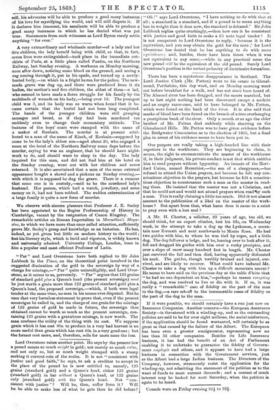Lord Overstone raises another point. He says by the present
law a pound means so much weight in gold ; not merely so much value, and not only so, but so much weight stamped with a stamp making it current coin of the realm. It is not "consistent with justice and good faith," he says, to ask a creditor to accept in the place of the pound he is now entitled to, namely, 123 grains (standard gold) and a Queen's head, either 123 grains (standard gold) in bar without a Queen's head, or 122 grains only (standard gold) with the Queen's head. Not "con- sistent with justice " ? Will he, then, suffer from it? Will he be able to make less of what he gets than he did before?
"Oh !" says Lord Overstone, "I have nothing to do with that at all; a standard is a standard, and if a pound is to mean anything less in weight than it does now, the standard is debased." Sir John Lubbock replies quite crushingly,—then how can it be consistent with justice and good faith to make a /5 note legal tender ? It is not competent to Lord Overdone to reply, 'because it is the equivalent, and you may obtain the gold for the note ;' for Lord Overstone has denied that he has anything to do with mere equivalence; and, besides, there have been times when it was not equivalent in any sense,—while in any practical sense the new pound will be the equivalent of the old pound. Surely Lord Overstone's position is the veriest pedantry of doctrinaire formalism.






























 Previous page
Previous page